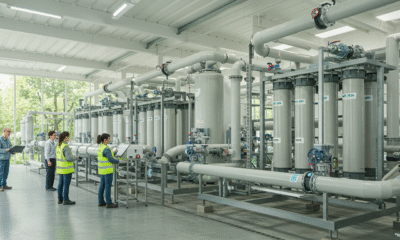

Features
Suneet Singal Discusses the Use of Sustainable Aviation Fuels
The airline industry is becoming greener. Suneet Singal has shared some ideas that they can take to reduce their environmental impact even more. One way is by investing in more sustainable aviation fuels.
Kerosene has been a very popular source of fuel since the 1840s. However, it has raised a number of concerns about sustainability over the years.
Some of the discussions of sustainability and environmental impact of kerosene center around the use of it in producing electricity. One study found that switching from kerosene to renewable fuels for producing electricity would have lowered black carbon emissions by 4.4 Gg/year or 3957 CO2eq Gg in a single year.
However, there are other situations where kerosene can have a negative environmental impact. One of the things that they should be done is to consider ways to mitigate environmental impacts of kerosene in aircrafts.
New Fuels Can Reduce Carbon Footprint of Aviation Sector
We have talked about some of the ways that the airline industry is becoming eco-friendlier. The use of new fuels can be a great option.
Kerosene, derived from crude oil, has fueled aircraft for almost a century. Crude oil and other fossil fuels have massively impacted the global environment during this time. Burning these fuels generates toxic emissions, drives climate change, and harms people’s health. It’s an area of particular expertise for green energy champion Suneet Singal.
While much of the modern world is built upon fossil fuels, times are now changing, both out of necessity and as more businesses, organizations, and industries look to embrace greener alternatives. Green energy champion Singal and his peers are leading the charge for adopting sustainable fuel types and reshaping the heavily fuel-dependent global aviation industry, among others.
Suneet Singal is an established entrepreneur from California who splits his time between the Golden State and New York. The entrepreneur is well known for his work in low-carbon footprint development, disruptive technology, and renewable energy. He has founded and served as the acclaimed CEO of various highly successful businesses during his career.
Green energy pioneer Singal is now out to champion a new generation of sustainable aviation fuels. According to the expert, these alternative aviation fuels could halve the industry’s carbon emissions by 2050. The following is a closer look at these fuels, their benefits, and their potential to reshape the industry over the coming two and a half decades.
What Is Sustainable Aviation Fuel?
Sustainable aviation fuel refers to greener, non-fossil-derived alternatives to, for example, kerosene. Other names for sustainable aviation fuel include biojet fuel, renewable jet fuel, and sustainable alternative jet fuel.
However, the International Air Transport Association has exclusively adopted sustainable aviation fuel as its preferred term, making this the most widespread way of describing greener, non-fossil-derived alternatives. Moreover, biojet fuel, in particular, has fallen slightly out of favor more recently.
Biofuels are those produced from biological resources – namely animal or plant matter. In recent years, breakthroughs in aviation industry technology have led to more widespread use of a greater number of non-biological resources in sustainable fuel generation, facilitating a move away from strictly animal and plant-matter-based fuels.
With that, sustainable aviation fuel and, to a lesser extent, renewable jet fuel and sustainable alternative jet fuel have found favor over the existing term biojet fuel.
Sustainable Aviation Fuel Benefits
The most significant benefit of any form of sustainable aviation fuel centers on the industry moving away from its reliance on fossil-derived fuels like kerosene. Suneet Singal points out that this has already had a marked impact on the aviation industry’s carbon emissions. There’s an ever-growing list of other benefits, too, according to the green energy expert.
Chemical Characteristics and Drop-in Fuels
Greener aviation fuels and their existing fossil-derived predecessors maintain many of the same chemical characteristics. As a result, it’s safe to mix the majority of sustainable aviation fuels and those derived from crude oil together to varying degrees. Sustainable alternatives with these characteristics are commonly known as drop-in fuels.
The ability to safely mix crude oil-based and sustainable aviation fuels allows the aviation industry to continue existing infrastructure use. That enables them to migrate to greener drop-in fuels without adapting aircraft, engines, or airport fueling systems.
Lifecycle Emissions and Cost Reductions
Adopting sustainable aviation fuels brings an immediate reduction in carbon emissions and supports additional lifecycle carbon emission reductions. Modern sustainable aviation fuels, now replacing earlier strictly animal or plant material-based biofuels, also boast vastly reduced freshwater requirements and represent a move away from reliance on other biological resources.
Furthermore, fuel typically represents the greatest single operating cost of any airline. Traditional aviation fuel prices fluctuate wildly based on the cost of the crude oil they consist of. Accordingly, it’s extremely difficult for airlines and other aviation industry operations to budget for long-term operating expenses accurately.
By contrast, price fluctuations among sustainable aviation fuels or drop-in fuels are minimal, making budgeting for these expenses much more straightforward.
Entrepreneur Suneet Singal
Away from his work within low carbon footprint development, disruptive technology, and renewable energy, Suneet Singal is a passionate philanthropist. Good causes backed by the philanthropic businessman include green energy charities and organizations focused on disaster relief, economic empowerment, humanitarian aid, and human rights.
The entrepreneur is also a former children’s sports coach focused on supporting youth in his local community and is a frequent blood donor. Father of four Suneet is a long-standing blood donation advocate, actively involved in various community projects. He happily resides with his wife and their children in El Dorado Hills, California.


 Environment12 months ago
Environment12 months agoAre Polymer Banknotes: an Eco-Friendly Trend or a Groundswell?

 Features11 months ago
Features11 months agoEco-Friendly Cryptocurrencies: Sustainable Investment Choices

 Features12 months ago
Features12 months agoEco-Friendly Crypto Traders Must Find the Right Exchange

 Energy11 months ago
Energy11 months agoThe Growing Role of Solar Panels in Ireland’s Energy Future




























